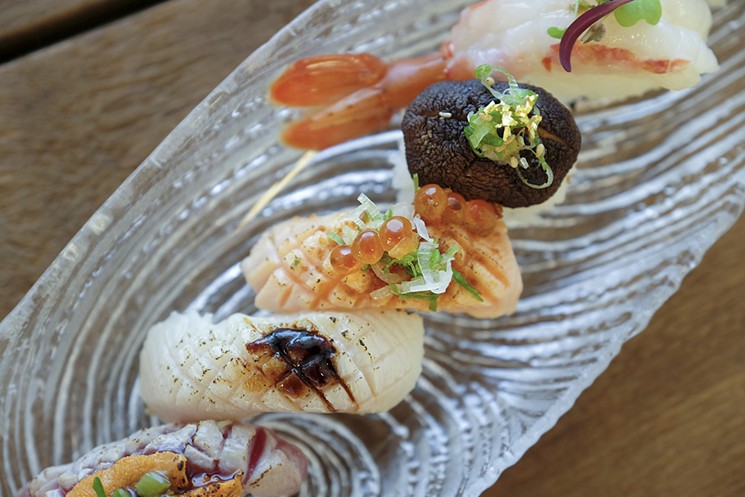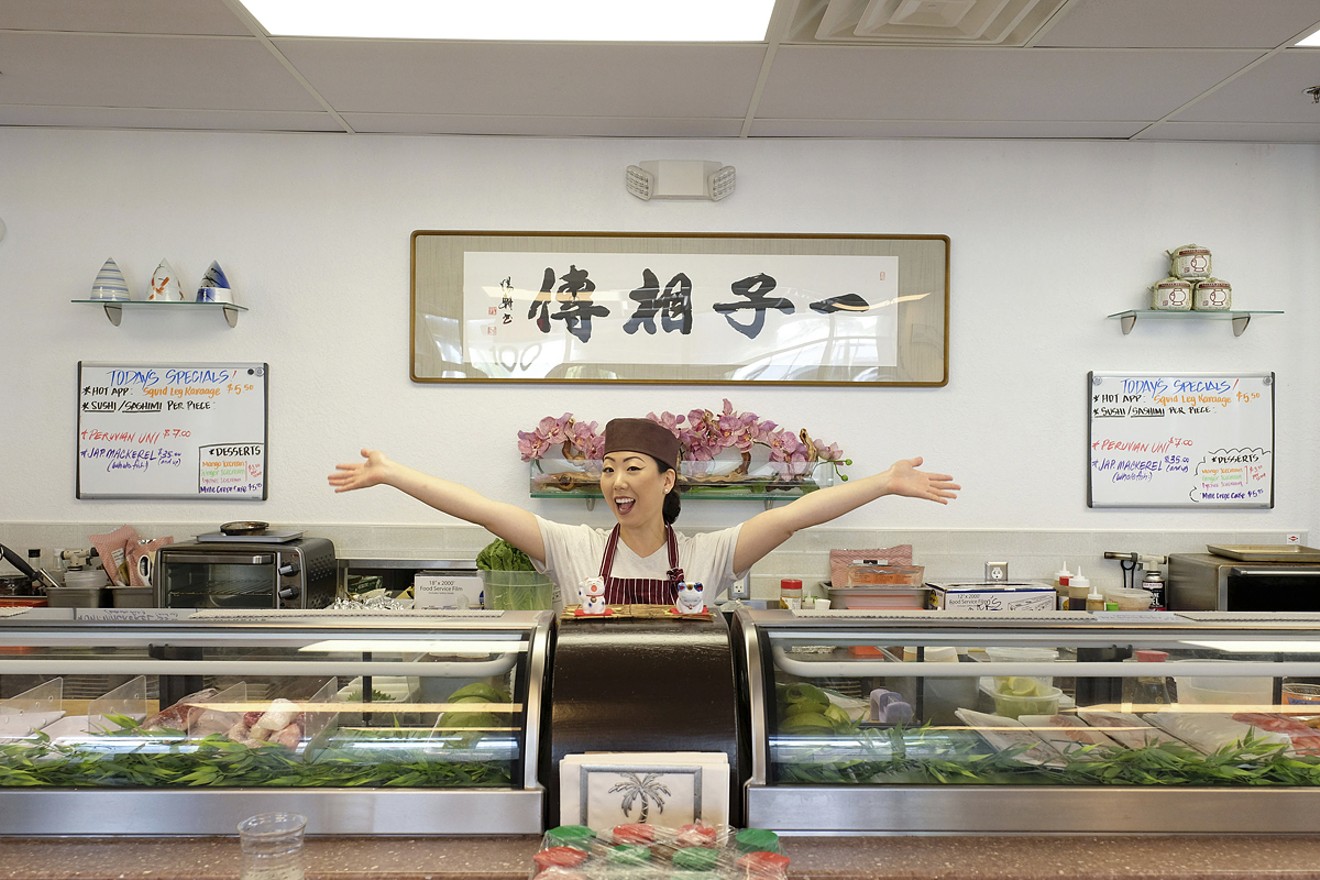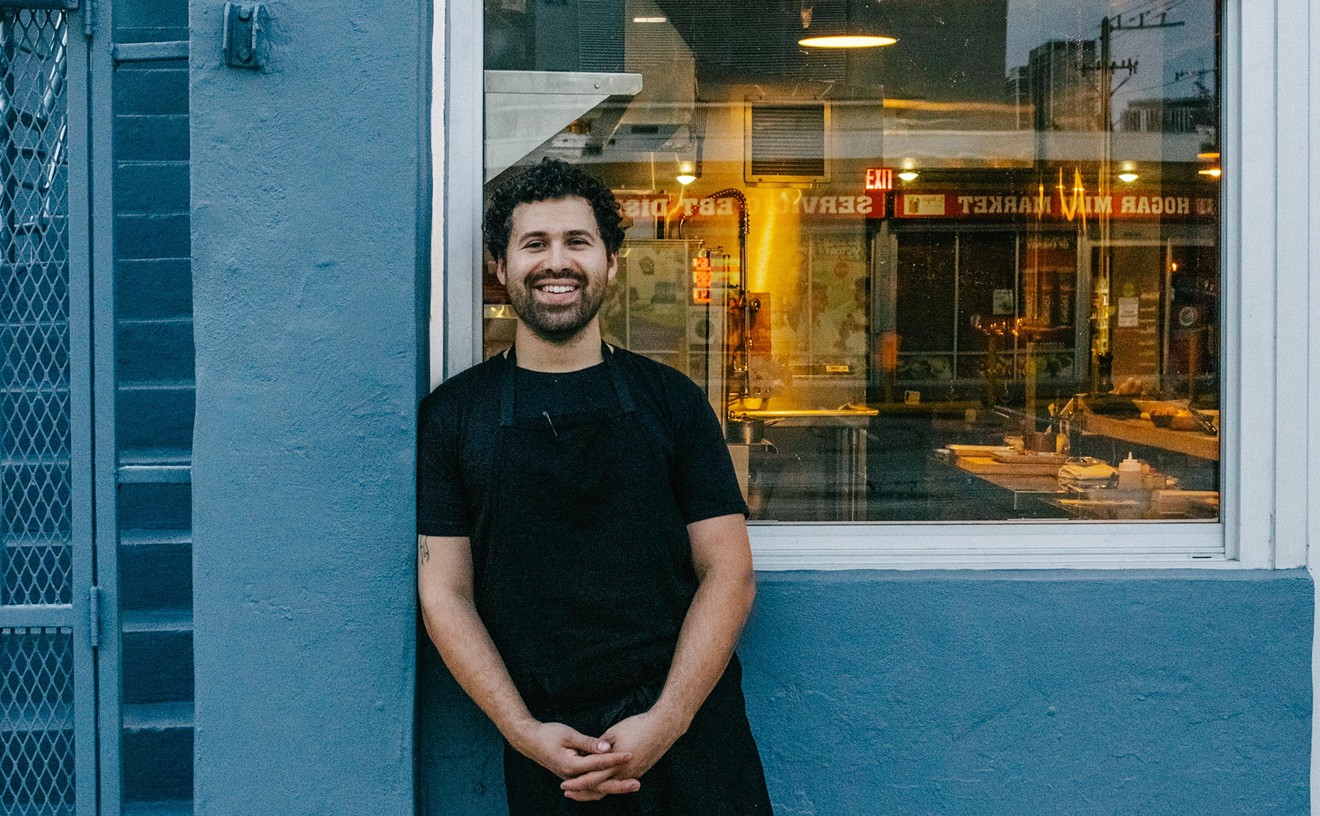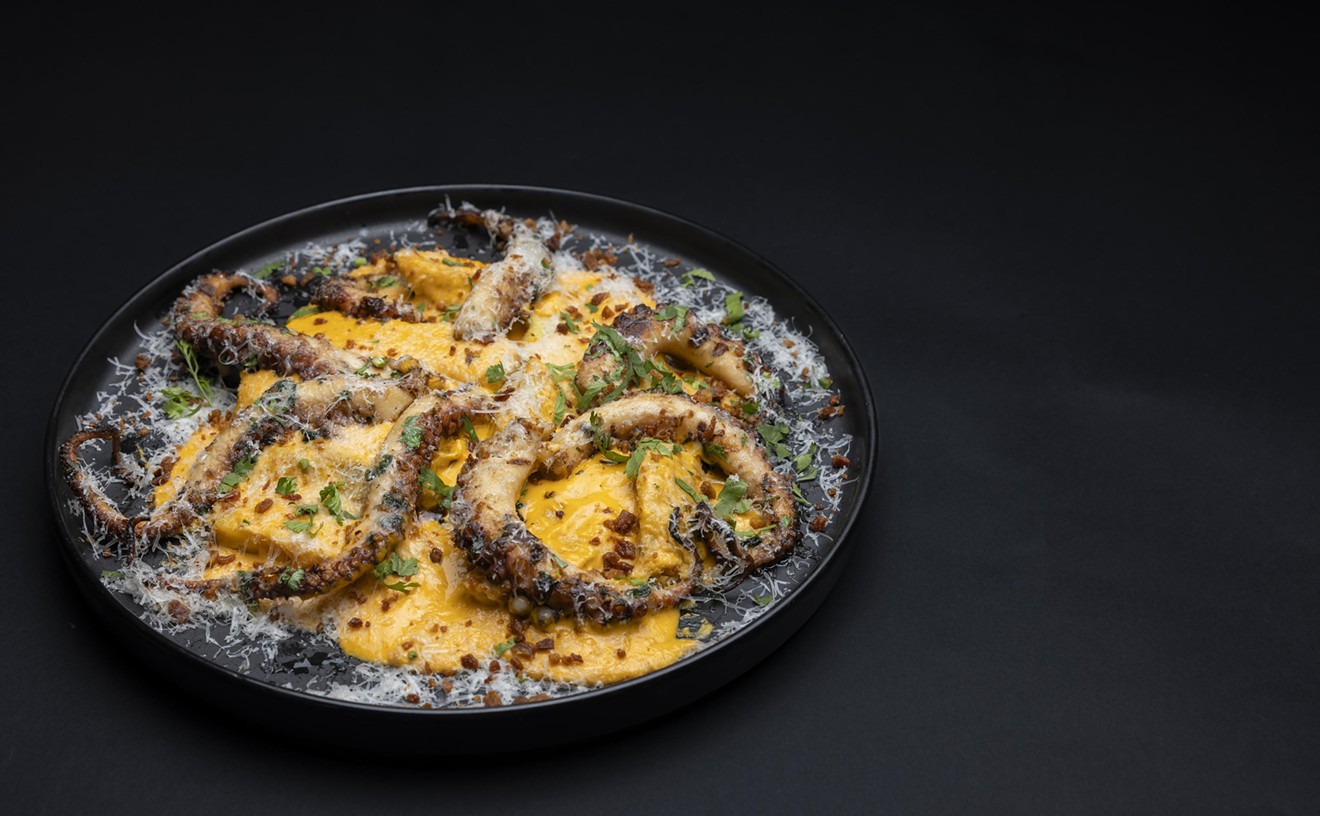Erika Kushi never thought of herself as a female sushi chef until the day someone told her she shouldn't be.
"It was a Japanese customer," she recalls. "They said, 'You're not supposed to be doing sushi because of your warm hands.'"
Her father, Michio Kushi, who for nearly three decades was a fixture behind the minuscule sushi bar at North Bay Village's beloved but now-shuttered Sushi Deli, told her to ignore it.
The idea that women cannot be sushi chefs because of reasons ranging from body temperature to perfume has been used by male sushi chefs across generations to maintain hegemony behind the counter. Jiro Ono, who rocketed to global fame following a 2011 documentary about his subterranean Tokyo sushi temple and whose feet have been worshipped by likes of Noma's René Redzepi and Anthony Bourdain, once told the Wall Street Journal that women cannot be sushi chefs because they menstruate.
Michio subscribed to no such malarkey. The temperature of the fish and rice was barely at risk given the short time each spent in their hands, he said. And if Erika was concerned about it, she could keep a glass of ice water next to her workspace.
For nearly a decade, she was a fixture alongside her father at her family's small restaurant and market that sold everything from frozen ramen noodles and hamachi collars to Japanese books, kitchen supplies, and the umami-packed rice seasoning furikake.
"My dad always said good food, even bad food, is an investment in yourself, in your palate."
tweet this
Though Sushi Deli closed in early 2017, the 30-year-old, standing five feet tall and wearing a swoop of black liner on her piercing eyes, can now be found behind the sushi bar at her namesake, Sushi Erika (1700 John F. Kennedy Cswy., Suite 100; North Bay Village; 786-216-7216), less than a mile from the spot where her family became a Miami legend. But here, she's doing it alone after her father's unexpected passing a mere five months into his retirement. Though her mother, Mayumi, remains at her side and in the restaurant, this new project is wholly Erika and one that has challenged her more as a person and as a chef than she ever thought possible.

Neither Erika nor her father was destined to stand among the city's best-known sushi chefs. Michio was born in Wakayama Prefecture, about a two-hour car ride south of Osaka, and started his career as an overworked salaryman. By his early 20s, he'd had enough, and his family encouraged him to turn his proclivity for home cooking into something more. He worked in a small neighborhood sushi restaurant before following his brother and sister-in-law to America, first to New York and then Miami, where on NE 79th Street at the end of the '80s, the family debuted the progenitor of Coral Gables' Su-Shin Izakaya.
Eventually, they opened the Japanese Market just across the water, bringing in fish and pantry staples for Miami's very small Japanese community and exporting Japanese products through local consular offices.
"My dad would help out at Japanese Market occasionally, and my mom said, 'Let's just buy it from them and do our own thing,'" Erika says. Everything was going well until September 11, 2001, when the terrorist attacks that destroyed the World Trade Center sent their export business into a tailspin. Mayumi suggested Michio start selling basic sushi such as California rolls and tekka maki. Michio rebuffed early criticisms and eventually found his stride with visually stunning omakase platters bursting with fatty tuna topped with fresh wasabi; seasonal nigiri like needlefish and golden eye snapper alongside luscious salmon belly capped with green onions; tender, sweet shrimp crowned with sesame and seaweed; and meaty slices of giant clam squiggled with a house chili sauce.
It was a bastion for sushi lovers, particularly those who could not afford to frequent pricey places such as Naoe, Nobu, and Makoto.
The business did well enough provide a young Erika with a comfortable upbringing. She attended a private Catholic school in Broward County and spent her teenage years helping in the restaurant and deeply ensconced in eating well.
"My parents are awesome cooks, and my dad, no matter how tired he was at the end of the day, wanted to eat well," Erika says. Their tables were littered with everything from tempura to meaty mussels simmered in garlic and miso to hearty Japanese potato salad.
"My dad always said good food, even bad food, is an investment in yourself, in your palate, and you can always be learning something and getting new ideas," she adds.
Her parents never pushed her toward one career path or another, but somehow she gravitated toward cooking. After high school, Erika enrolled in Johnson & Wales University and graduated in 2010. Following a short stint at Michelle Bernstein's Biscayne Boulevard restaurant Michy's, she returned to Sushi Deli and quickly became the linchpin of the operation. While her father was the face of the restaurant, looking stern with a pencil mustache as he carefully assembled each custom platter, it was Erika who made it all work. She spent long hours directing the kitchen, which at first served only four seats that ballooned to 16 before closing. And she was the one rolling seaweed and vinegared rice with the fermented soybeans natto and the sweet simmered Japanese gourd kanpyo. She also handled most of the place's signature rolls, such as the Marie (spicy tuna with crispy garlic) and ultra-traditional battera, in which sushi rice and vinegar-cured mackerel are pressed into a rectangular bamboo mold, topped with seaweed jelly, and sliced into two-bite slugs. All four, along with much of Sushi Deli's original menu, are available at Sushi Erika.
"My dad would call me the control tower," she recalls. "He would make the sushi, but I'd be the one directing everybody."
Her importance became even clearer when she took a rare day off, leaving the kitchen rudderless.
As time passed, Erika and her father continued to grow closer, to the point where they could anticipate each other's needs and next move in life and in the kitchen. The whole time, though, Michio was imparting his cooking ethos to his daughter. He taught her to use the best products possible, no matter what other restaurants were doing. He taught her to keep prices as low as possible, a factor that helped Sushi Deli gain its dedicated following, and, most of all, to make it right every single time.
"When my dad made food, he was all in," Erika says. "Sometimes a customer might complain, 'Where's my food?' But my dad, he was so detailed, he didn't want to rush things just to get them out, and he always said once the customer receives the food, he wanted them to say, 'Wow!'"
It all came to a halt when Sushi Deli closed March 20, 2017. Michio, who was 68, had been taking increasingly longer trips to visit family and friends in Japan and seemed ready to cap off his career with a final shiso-and-uni-speckled omakase sashimi platter before shedding his paper cap and heading off into the sunset.
Yet retirement was short. It seemed that without the daily ritual of cleaning and slicing fish, greeting longtime guests, and reminding new ones not to talk on their phones while seated at the sushi bar, his health began to falter. He stopped playing golf and was wracked by constant stomach pain. Doctors couldn't peg his ailments to one specific problem.
"His body just started failing," Erika says.
"I didn't care if my dad could be there with me all the time. I would never feel any competition. We were a team."
tweet this
On November 13, 2017, Michio passed away, and though Sushi Deli had closed about five months earlier, the family had signed a lease on a space in a new building less than a mile away. Erika would have to do it alone. All along, the plan had been to name the place Sushi Erika and put her at the helm, with Michio and Mayumi assisting.
"My mom told my dad: 'Hey, it's going to be Sushi Erika. You can come and visit, but it's her restaurant,'" Erika recalls. "But I didn't care if my dad could be there with me all the time. I would never feel any competition. We were a team."
Doing it without the possibility of Michio's help was a scenario the family had never imagined. But they poured themselves into the new place, a kind of therapy that came to fruition just shy of a year later when Sushi Erika opened August 8, 2018.
"We're full-on devoted to getting this going," Erika says.
The space is festooned with images and remembrances of Michio. The lucky cats that once perched on the bar at Sushi Deli are here, as are an old photo of him grinning as he stands behind a fat loin of bigeye tuna, and a scrapbook of his omakase platters that regulars enjoyed and photographed over the years.
What isn't as obvious are the trios of meaningful objects, symbolizing the closeness of the Kushi family and how its members came to rely on one another over the years. Three painted lucky bamboo shoots sit on a shelf behind the sushi bar near another trio of old-style sake vessels. Three bells hang on a curtain that separates the kitchen from the main dining room, and even the restaurant's logo includes three arrows leaning against one another.
Behind the sushi bar, four black kanji characters painted onto a white scroll with a greenish-khaki background symbolize the Japanese tradition of passing down the business to the eldest son. Though the Kushis didn't have a son, Michio commissioned the famed Japanese calligrapher Mochizuki Toshikata to create the scroll, which seems to encapsulate the family in near-ascetic simplicity.
"It's a message from my family," Erika says. "This symbolizes my parents passing down to me, the only child, not only the business but all the love, all the traditions we have."
Those traditions, it seems, have helped carry all of the regulars from Sushi Deli to Sushi Erika. She arrives each morning around 9:30 and starts rinsing and steaming the day's rice. As it cooks, the kitchen staff arrives and Erika begins cleaning fish for the day: a whole side of salmon, a 15-pound loin of tuna, and perhaps something seasonal like sweet little firefly squid from Japan. By the time the rice is finished, cooks arrive to help set up the sushi bar and prepare the restaurant for its first guests. Meanwhile, Erika is in the back, seasoning the rice with a combination of red vinegar, seaweed, and sugar. At some point, the clock hits 11:30 a.m., and already a half-dozen people are waiting outside the locked doors. When she opens them at noon, the dining room fills in a flash. Most of them are regulars, whose orders Erika knows by heart.
John and Melissa Didovic, a doctor and a nurse, began visiting Sushi Deli in 2011 on a friend's recommendation. Since then, the two have become parents and have little time to eat out, but they regularly steal away to Sushi Erika, as they did at Sushi Deli, for a quick lunch and escape from the world. Their order has remained mostly unchanged: a couple of her signature rolls, a tuna tartare ($8.95), and an octopus tiradito ($13.95).
"It's incredible to see her take everything she's done and everything she's learned and create something for herself," John Didovic says. "It seems like these days, you very rarely see a family business last through different generations, and I think it's something special. You don't think Steve Aoki will be greeting people at Benihana across the street when it reopens, do you?"











